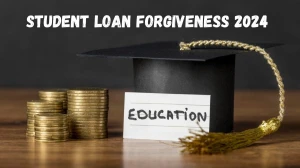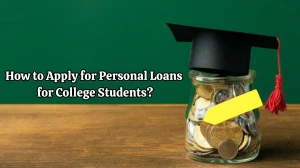
Student Loans For Bad Credit of January 2024
For individuals with bad credit or no credit history, student loan options include federal options like Federal Direct Subsidized and Unsubsidized Loans, as well as private lenders such as Ascent, A.M. Money, Funding U, and Prodigy Finance, with varying interest rates.
by Kowsalya
Published Aug 16, 2023 | Updated Jan 22, 2024 | 📖 4 min read
Student Loans for Bad Credit of January 2024
In January 2024, navigating the landscape of student loans for individuals with bad credit becomes crucial. This overview highlights key options, such as federal direct subsidized and unsubsidized loans, as well as private alternatives like Ascent and Funding U, providing insight into variable and fixed APRs to guide prospective borrowers in making informed decisions.
|
Company |
Variable APR |
Fixed APR |
|
Ascent Undergraduate Non-Co-Signed Credit-Based Loan |
9.46% to 15.35%* (Non Cosigned) |
8.77% to 14.56%* (Non Cosigned) |
|
A.M. Money |
N/A |
8.34% to 8.87% |
|
Ascent Undergraduate Future Income-Based Loan |
13.26% to 15.22%* (Non Cosigned) |
12.63% to 14.59%* (Non Cosigned) |
|
Federal Graduate PLUS Loan |
N/A |
8.05% |
|
Federal Direct Subsidized Loans |
N/A |
5.50% |
|
Funding U |
N/A |
6.99% to 12.49% with auto-pay |
|
Federal Direct Unsubsidized Loan |
N/A |
5.05% |
|
Prodigy Finance |
14.997% |
N/A |
How to Apply For Student Loans With Bad Credit?
Applying for student loans with bad credit involves specific steps to increase your chances of approval, whether pursuing federal or private options.
Federal Student Loans
Complete the FAFSA
If you're seeking federal loans, start by submitting the Free Application for Federal Student Aid (FAFSA). Regardless of your credit history, most federal loans don't require a credit check.
Select Your Desired Loan
After approval, choose your desired federal loan type, such as Direct Subsidized or Unsubsidized.
Sign Final Paperwork
Complete the necessary paperwork before the disbursement of funds to your school.
For PLUS Loans
If applying for federal PLUS loans (available to graduate students or parents of undergrads), submit the FAFSA and an additional PLUS loan application online. Be prepared for an "adverse credit" check, looking for specific red flags in your financial history.
Adverse Credit Check
If the credit check poses challenges, explore options like adding an endorser or appealing the decision.
Private Student Loans
Check Your Credit
Prior to applying for private loans, check your credit score. If time allows, work on improving your credit for better chances of approval.
Research Lenders
Explore and compare private student lenders, considering eligibility requirements, interest rates, and fees.
Co-signer Consideration
If your credit is a concern, assess whether adding a co-signer is an option. A co-signer can boost your chances of approval.
Prequalify with Lenders
Many lenders allow prequalification, providing an estimate of interest rates and loan terms without a hard credit check. Use this to compare offers.
Application Process
When ready to apply, submit the application, providing personal and financial information. Both you and your co-signer (if applicable) may need to complete this step.
Decision and Disbursement
Most lenders offer quick decisions, and upon approval, finalize the paperwork for the disbursement of funds.
How to Get a Student Loan Without a Co-signer?
To secure a student loan without a co-signer, explore federal options like Direct Subsidized and Unsubsidized Loans, which don't require a credit check. If you need more funds, consider private lenders such as Ascent, which offers non-co-signed credit-based loans.
For graduate students, Federal Graduate PLUS Loans are available but involve a credit check. When applying for private loans, check your credit score, research lenders, and compare fees and interest rates. Remember, federal loans offer additional protections and flexible repayment options compared to private loans.
Explore Loans from a new perspective with MarketsHost extensive range of informative resources and insights from industry experts.
What Are the Alternatives If You Can't Get Student Loans Without a Co-signer?
If you're unable to secure student loans without a co-signer, there are alternative options to explore:
Contact the Financial Aid Office
If you're facing challenges in obtaining the necessary funds for your education, reach out to your college's financial aid office. They can assist you in identifying additional aid opportunities, including federal programs or local scholarships.
Search for Scholarships and Grants
Unlike loans, scholarships and grants do not require repayment. Explore various organizations that offer financial assistance based on factors such as academic achievements, athletic accomplishments, family income, ethnicity, niche interests, or special talents. Earning scholarships can reduce your overall borrowing needs.
Consider Income-Share Agreements (ISAs)
ISAs are agreements where you commit to pledging a portion of your future earnings in exchange for upfront college funding. Colleges and third-party lenders typically offer ISAs, considering factors like your major, expected future salary, and academic performance. While ISAs don't accrue interest, it's crucial to understand the terms, as repayments may vary based on your future income.
Student Loans For Bad Credit of January 2024- FAQs
1. Can I get a student loan with bad credit?
Yes, it's possible, but options may be limited, and terms might not be as favorable.
2. Do federal student loans require a credit check?
Most federal student loans, like Subsidized and Unsubsidized, don't require a credit check.
3. Most federal student loans, like Subsidized and Unsubsidized, don't require a credit check.
Consider adding a co-signer or appealing for approval.
4. How can students improve their credit scores?
Improve credit by making on-time payments, using credit responsibly, and monitoring credit reports.
5. Are there private student loans available without a credit check?
Private loans typically require a credit check, but some lenders may consider alternative factors for eligibility.




